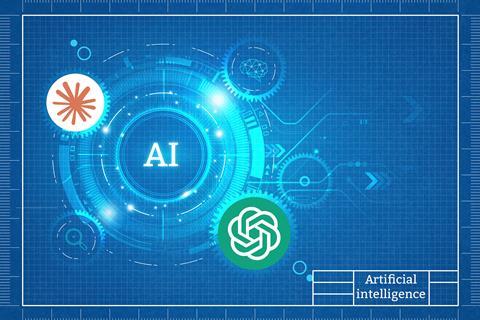Is generative artificial intelligence improving learning and teaching?

In 1980, Seymour Papert said in Mindstorms: children, computers and powerful ideas that the aim of AI development was to bring abstract ideas about thinking into reality. In 2025, it seems more possible than ever, yet research into harnessing generative artificial intelligence (GenAI) to enhance pupil engagement in chemistry is still in its infancy.
In 1980, Seymour Papert said in Mindstorms: children, computers and powerful ideas that the aim of AI development was to bring abstract ideas about thinking into reality. In 2025, it seems more possible than ever, yet research into harnessing generative artificial intelligence (GenAI) to enhance pupil engagement in chemistry is still in its infancy.
So, could GenAI be the panacea that improves learning outcomes, critical thinking and problem-solving skills? Can it realistically reduce teacher workload?
ChatGPT first came to my rescue in 2022 while I was teaching full-time, managing a team and completing a national professional qualification. It summarised key documents, giving me time to improve my AI prompting skills. But how are other educators using it?
Using AI for admin, MCQs and more …
Admin, MCQs and more …
In her session at the ASE annual conference 2025, ‘Using AI in the chemistry classroom – tips, tricks and failures’, Penny Robotham – vice principal at The National Mathematics and Science College – demonstrated how Chat GPT4.0 can reduce admin and create novel chemistry teaching resources. Writing effective prompts for GenAI is no longer hit and miss as OpenAI has an academy to share valuable advice.
Chemistry teachers report using AI to generate multiple choice questions (MCQs), and say it can boost retrieval practice, too. Head of chemistry Neil Goalby finds ChatGPT is especially useful in explaining the reasoning behind MCQ answers. But he and others stress the importance of owning the outputs.
Weaving real-world context into chemistry lessons brings the abstract closer to reality. Sourcing authentic, contemporary content, however, is time-consuming. Kate Comisso, a teacher in Scotland, tried using GenAI to source forensic science case studies, only to find it ‘conjured up new evidence for famous cases’. GenAI hallucinations are a major flaw, but could you use them creatively to your advantage? For example, could GenAI generate organic mechanisms explanations and resources that contain deliberate mistakes?
Get involved
I’d love to hear your experiences or other educational technology you’d like to see in this series. Comment or email education@rsc.org with the subject EiC Tech talk.
Get involved
Send your comments, ideas and case studies to education@rsc.org with the subject EiC Tech talk.
I used GenAI as a storyteller in an online RSC Education teacher support session, ‘Contextualising practical work in chemistry’, in 2024 (you’ll find all the upcoming events online). Teachers in the session collaborated on how practical work directly connects to the world. After, I used Claude.ai to tabulate the teacher-suggested contexts and prompted it to generate realistic scenarios. In the follow-up session, teachers enhanced the AI-generated scenarios. They identified the scenario ‘Gary’s Garage is restoring cars and wants to use chemistry to electroplate metal parts to prevent rust and corrosion’ as a good hook to introduce electrochemistry. One head of chemistry reported, ‘As a department we will apply the table of practical, context and scenario. This will then help us to get our students even more excited about chemistry.’ Why not download the table (available as pdf and Word) or use AI to create other scenarios?
You can train ChatGPT as a Socratic tutor and help students engage critically with GenAI responses too. Research suggests there may be educational benefits in conversational teachable agents where the pupil takes on the role of teacher.
However, schools outreach fellow at the University of Warwick, Nick Barker tells me that bespoke AI-driven maths tutorial software ‘is having little impact on the attainment of pupils indifferent to study as they also tend to be less willing to use the software’.
Overcoming challenges and pursuing potential
The UK Government’s 2025 policy paper claims GenAI frees up time to ‘focus on delivering excellent teaching’. And according to Teacher Tapp, two-thirds of teachers have experimented with AI. But, in the 2024 Science Teaching Survey, the RSC reported that only 3% of teachers found AI greatly reduced their workload. What is teachers’ trust in AI driven educational technology? Are schools purchasing it to address teacher shortages? Can GenAI accurately grade and generate feedback on GCSE six-mark questions like you do? GenAI has potential in comparative judgement but the human remains in the loop.
The UK Government’s 2025 policy paper claims GenAI frees up time to ‘focus on delivering excellent teaching’ (bit.ly/4jFMJsC). And according to Teacher Tapp, two-thirds of teachers had experimented with AI. But, in the 2024 Science Teaching Survey, the RSC reported that only 3% of teachers found AI greatly reduced their workload (rsc.li/3RSYy2X). What is teachers’ trust in AI driven educational technology? Are schools purchasing it to address teacher shortages? Can GenAI accurately grade and generate feedback on GCSE six-mark questions like you do? GenAI has potential in comparative judgement but the human remains in the loop.
There are concerns regarding GenAI’s academic integrity, data privacy and security, inequitable access, bias and fairness. Importantly, we should also question the environmental impact of the supercomputers that feed on vast amounts of data.
Tech has long promised to transform teaching. Will AI-driven educational technology follow the path of school-wide iPad rollouts – revolutionary or a costly distraction?
Let us know what GenAI’s done for you. Comment or email education@rsc.org with the subject EiC Tech talk.
Wendy Winnard is a former chemistry teacher and RSC Education Prize winner who now works at the Science and Technology Facilities Council
Downloads
AI practical contexts and scenarios table
Handout | PDF, Size 0.11 mbAI practical contexts and scenarios table
Editable handout | Word, Size 0.45 mb

Topics
Tech talk

From overhead projectors to AI, our new series explores educational technology and how teachers are using it to their advantage
- 1
 Currently
reading
Currently
reading
The AI experiment
- 3
- 4




















No comments yet